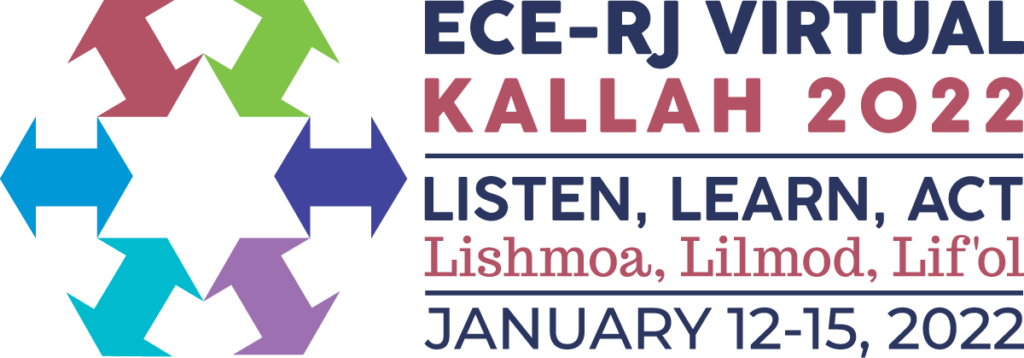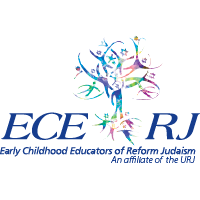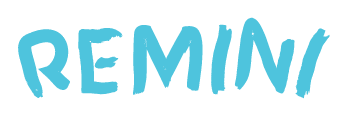2022 Kallah Recap
Lishmoa, Lilmod, Lif’ol (Listen, Learn, Act):
Creating Responsive Community by Breaking Barriers & Building Bridges.
The 2022 ECE-RJ Virtual Kallah, Lishmoa, Lilmod, Lif’ol (Listen, Learn, Act): Creating Responsive Community by Breaking Barriers & Building Bridges was a huge success! With over 570 registrants, this ECE-RJ Kallah took a deep dive into how we listen, learn, act, to create the community every individual needs such as:
- Stronger support for Jews and educators of color
- LGBTQ+ awareness and minority rights
- Equal access and accessibility, and more
During the four days of Kallah, we explored the many ways we can further our work together, to open up our ears and widen the tent surrounding us. The Kallah workshops allowed for deep and meaningful conversations that challenged us to explore the importance and value in listening to others with an authentic and open-mindset. We learned from a variety of voices and perspectives, providing us with important takeaways to facilitate much-needed change, with the goal of taking action–breaking down barriers and building bridges!

During such a challenging time for early childhood administrators and educators who have been working longer hours to maintain a thriving learning community for children, teachers, and families during the Covid pandemic, it was powerful to have sacred time and space to come together and support one another in our learning–sharing our personal journeys and feeling reinvigorated with the joy of why we do what we do–advocating for quality and supportive early childhood classrooms and community where everyone is accepted and celebrated. We had moments to unwind, laugh, sing, and celebrate.
“I thought that last year’s conference was one of the best I had ever attended. This one exceeded that. The speakers have managed to provide content that is not only applicable to early childhood education but allows me to gain confidence and comfort in my ability to continue this work in my school and on the DEI committee at my temple. I can’t tell you how grateful I am!” –Amy Damast
Here are few highlights of some of our Kallah sessions:
Day 1, LISTEN
Leah Solomon (she/her) shared approaches, tools, and insights from her work at Encounter, an organization that has brought over 2000 American and Israeli Jewish leaders into constructive engagement with Palestinians living in the West Bank and Jerusalem. Leah taught us that listening to children means you are modeling what it looks like to listen closely, and that it is important to enter into a conversation with the willingness to “be messy”–recognizing you do not have all of the answers. Solomon explained, it is important to give yourself grace as you practice deep listening–extending a generous spirit to yourself. Kallah attendee, Susie Wexler commented during the session, “I don’t have time not to do this. I need to cultivate wisdom for myself.”
Tamar Ghidalia (she/her), Educator, Jew of Color and professional musician helped us view justice through a preschoolers’ eyes, providing opportunities in classrooms for Jews of color and White Jews to build shared language with one another to discuss issues of race, racism, and injustice.
Karen Hoffman (she/her) Chief Executive Officer of Living on Purpose led a session titled, Listening and Cultivating Words that Matter. Through listening and cultivating practices that focus on universal values, middot, that matter in our everyday lives, we learned that we can live our lives more intentionally. Hoffman showed us how to incorporate these skills into our classrooms to help instill mindfulness and intentional living as part of our everyday existence.
The evening opened with a heartfelt and soul-filled session of music and a personal narrative lead by Rabbi Sandra Lawson (she/her), titled, Black, Jewish and Queer: Navigating Judaism with Multiple Identities and Building Bridges.
Batya Levine (she/they) guided us in breathwork and song in the session: Listening Inward: Breath, Body, & Song. We settled into the evening and ourselves with feelings of acceptance, remembering our strength, personal power, and resilience. “However you’re arriving with us here tonight, you’re alright,” Levine said.
Day 2, LEARN
Rachel Hall and Tani Prell opened the second day of kallah focused on LEARN: Building Inclusive Antioppresive Classroom Communities and shared how to create classrooms and communities that affirm and reflect the actual diversity of the Jewish people.
Eliana Rubin (she/they), Queer and Trans Artist and Educator, taught us ways we can foster safe and brave spaces for our children to learn so that classroom spaces are LGBTQ+ affirming for all learners and their families. This was the first part of a two-part session, the second of which was led by Rabbi Micah Buck-Yael from Keshet on Day 3.
The evening closed with an incredible panel discussion titled, Marginalized Voices Within our Jewish Communities moderated by Becca Taute (she/they) cdc@cbi assistant director at Congregation Beth Israel in Austin, TX. The panel featured 5 marginalized voices within our Jewish community: Kelly Whitehead (she/they) a 3rd year rabbinical student and Jew of color, Tony J. Westbrook (he/him) an African-American, Jewish activist and community leader, Lexi Rolfe (she/her or they/them), a queer and trans woman early childhood educator, and lesbian couple, Rabbi Robin Nafshi and Cantor Shira Nafshi, parents of a mexican daughter. Attendees learned what Jewish community means to these 5 panelists and what perception does to you when you don’t see yourself reflected back in your community–often being mistaken as a plumber or the serving staff. Lexi Rolfe said, “We each play a part in this broken world and must recognize the special part we play.”
Day 3, ACT
Boulder Journey School leaders, Andrea Sisbarro (she/her) and Jacie Engle (she/her) helped us take our learning into action by shedding light on children’s rights in a panel titled, The Core Beliefs of Supportive Social Learning – Rights and Responsibilities. Sisbarro and Engle shared with us the ways Boulder Journey School explores racial justice in their classrooms and school-wide community with their children, families, and educators. We also discussed children’s rights, children’s concept of rights, and what race looks like through the eyes of a child.
Rabbi Micah Buck-Yael (he/him), Director of Education and Training at Keshet, taught us how to build early childhood experiences in which children of all genders and family backgrounds can thrive, develop empathy, and celebrate diversity in his session titled, LGBTQ – Affirming Early Childhood Practices, the second of a two-part session, the first which was led by Eliana Rubin (she/they) Queer and Trans Artist and Educator.
Emily Ladau (she/her), Disability Rights Activist, and author of, Demystifying Disability: What to Know, What to Say, and How to be an Ally helped us confront our disability biases and take action to move beyond low expectations for people with disabilities and embrace the importance of holding high expectations for all. “No one is fully independent. We are all interdependent. We all rely on each other,” Ladau said.
Friday Night Shabbat
Rabbi Sandra Lawson’s Friday night Shabbat Service, with a powerful introduction from Rabbi Rick Jacobs (he/him) URJ President, helped us move away from a week of work, study, and troubled waters into a calm and peaceful shabbat, where we came together to sing and pray–refueled with love and light for the work we all do together.
Saturday, Together
On Saturday, Eliana Rubin (she/they) rejoined our Kallah to share her love of “Jewsicals,” showing us how the Torah, which holds many stories that can be interpreted and reinterpreted, can transform into a “Jewsical” (Jewish Musical), followed by Dr. Tamar Andrews (she/her) Educator and Early Childhood Education Director at Temple Isaiah Preschool in Los Angeles, CA who took us on a culinary adventure to explore the many recipes and traditions for Jewish breads around the world.
Shira Kline helped us close Kallah with a breathtaking and inspirational, meditative havdalah, providing us with space and time to reflect on our journey as we continue to strengthen the ways we listen, learn, and act in our early childhood and reform communities. We appreciate Yolanda Savage-Narva (she/her) Director of Racial Equity, Diversity, and Inclusion (REDI) for the URJ for being a part of our joyous havdalah, sharing a poem by Dr. Benjamin E. Mays and reminding us to continue to move forward in our work by challenging ourselves “to move from this transactional idea around listening, learning, and action–using them as a tool for transformational change.”
ECE-RJ is now making the recordings available for purchase for Directors. These recordings can be used with your colleagues to provide unique and exciting professional learning.
Directors can allow staff members to watch at their convenience or they can be used as a ‘watch party’ with guided discussion.
If you are interested in purchasing the recording links, please contact Tricia Ginis, Executive Director, ECE-RJ at [email protected], or use the form below.


